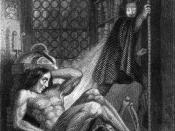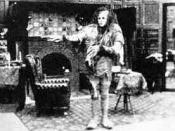The pursuit of knowledge is at the heart of Frankenstein, as Victor attempts to surge beyond accepted human limits and access the secret of life. Likewise, Robert Walton attempts to surpass previous human explorations by endeavoring to reach the North Pole. This ruthless pursuit of knowledge, of the light (see "Light and Fire"), proves dangerous, as Victor's act of creation eventually results in the destruction of everyone dear to him, and Walton finds himself perilously trapped between sheets of ice. Whereas Victor's obsessive hatred of the monster drives him to his death, Walton ultimately pulls back from his treacherous mission, having learned from Victor's example how destructive the thirst for knowledge can be.
The sublime natural world, embraced by Romanticism (late eighteenth century to mid-nineteenth century) as a source of unrestrained emotional experience for the individual, initially offers characters the possibility of spiritual renewal. Mired in depression and remorse after the deaths of William and Justine, for which he feels responsible, Victor heads to the mountains to lift his spirits.
Likewise, after a hellish winter of cold and abandonment, the monster feels his heart lighten as spring arrives. The influence of nature on mood is evident throughout the novel, but for Victor, the natural world's power to console him wanes when he realizes that the monster will haunt him no matter where he goes. By the end, as Victor chases the monster obsessively, nature, in the form of the Arctic desert, functions simply as the symbolic backdrop for his primal struggle against the monster.
Obviously, this theme pervades the entire novel, as the monster lies at the center of the action. Eight feet tall and hideously ugly, the monster is rejected by society. However, his monstrosity results not only from his grotesque appearance but also from the unnatural manner of...


